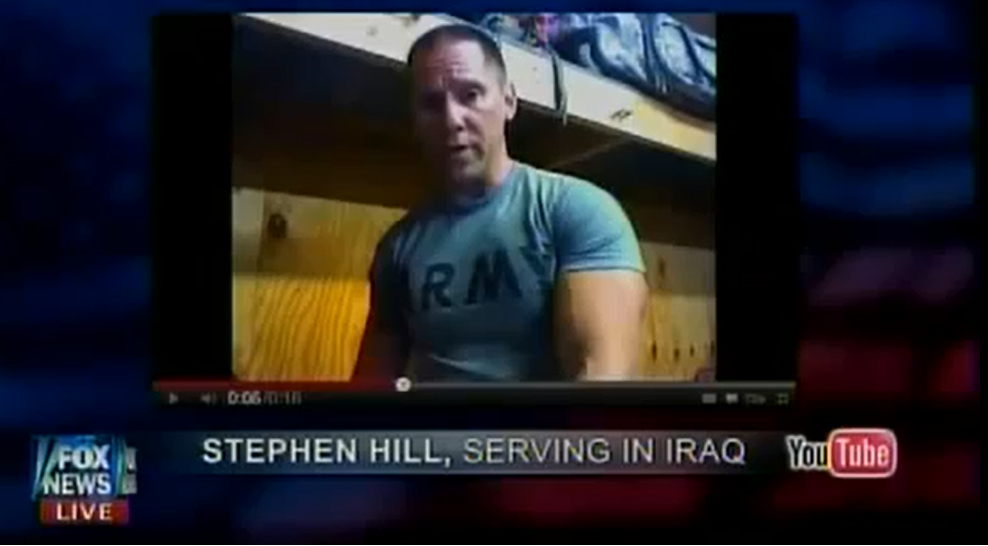Once again, Republicans held a presidential debate on Thursday night. And once again, the live audience helped give the party a black eye.
The debate, which took place in Orlando, Fla., and aired on Fox News, included questions from a panel of Fox personalities and from voters, who were invited to submit theirs through YouTube. The crowd’s big moment came in the second hour, when the topic turned to social issues.
“This question stirred up a whole lot of controversy online,” Fox’s Megyn Kelly said as she introduced a video submission. “It comes from Stephen Hill, who is a soldier stationed in Iraq.”
Hill, wearing a gray “ARMY” T-shirt, then appeared on-screen and told the candidates that he is gay and that he had been forced to lie about his identity when he was deployed to Iraq in 2010 because he didn’t want to lose his job. He then asked if the candidates would “do anything to circumvent the progress that’s been made for gay and lesbian soldiers” now that the “don’t ask, don’t tell, policy has been officially repealed.
His video then ended and … a handful of very loud boos erupted in the debate hall. Otherwise there was silence — not one cheer for an active-duty soldier asking the candidates if they’d let him continue serving his country without lying. No other voter-submitted question all night elicited such a harsh response.
The question went to Rick Santorum, who made things worse by not offering any words of appreciation for Hill’s service, which he didn’t even acknowledge. Instead, he declared that “any type of sexual activity has absolutely no place in the military,” that gays and lesbians have been given “a special privilege” by the repeal of DADT, and that the basic function of the military has been undermined because of it. Unlike Hill’s question, Santorum’s response produced loud applause and cheers that almost drowned him out as he finished speaking.
Kelly then followed up by asking Santorum about Hill’s particular situation: He’s admitted he’s gay — what would happen to him if you were president? Santorum allowed that he wouldn’t kick out anyone who had come out of the closet before he took office, but that he would reinstate the policy and not permit any future soldiers to make such an admission.
“We have to move forward with conforming with what was happening in the past, which is that sex is not an issue,” he said. “It should not be an issue. Leave it alone. Keep it to yourself whether you are heterosexual or homosexual.”
More cheers and applause. Here’s the full video of the exchange (post continues below):
When Santorum was done, the debate moved on to abortion. (Does it even need to be mentioned that none of the other eight candidates onstage took the opportunity to jump in and chastise the crowd, or at least to say “thanks” to the soldier?) But the moment figures to live on, especially because it’s part of what is a potentially problematic pattern for the GOP.
Recall that at the last debate, several audience members shouted their agreement when moderator Wolf Blitzer asked Ron Paul if a hypothetical uninsured 30-year-old male who goes into a coma and needs intensive care for six months should be left to die:
And in the debate before that, the mere mention by moderator Brian Williams of the 234 executions Rick Perry had overseen as Texas’ governor prompted the audience to erupt in cheers (continued):
The point has been made that it’s easy to make too much of these episodes — that only a few people seemed to be calling for the hypothetical uninsured man to die, or that the basic eye-for-an-eye concept of the death penalty is just as popular with most Americans as it was with that debate audience. Even on DADT, polling evidence suggests that most Republican voters are fine with repeal — as is the overwhelming majority of all Americans.
But the Republican Party has an image problem, too. A poll not long ago found that just 33 percent of Americans view the party favorably — an all-time low. Even if they are isolated, these debate outbursts end up generating considerable attention and helping to establish (or to reinforce) a sense among non-Republican voters that the GOP has gone off the deep end.
It could be that this won’t end up mattering in the end. If the economy is rotten enough, swing voters might end up voting straight ticket Republican next year no matter how extreme the GOP seems to them. But when members of a Republican crowd at a nationally televised Republican event start booing members of the military, it’s safe to say the GOP is playing with fire.


